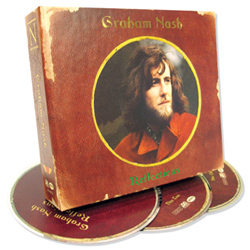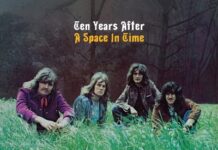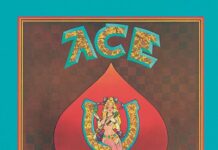In the aftermath of the 2008 reissue of Songs For Beginners,
Rhino wasted little time in packaging a more extensive Graham Nash collection.
Reflections, a three-CD retrospective, substantially ups the
ante, showcasing Nash’s five decade musical career with 64 glorious tracks,
many previously unreleased. Enclosed in a book-like package, the set also includes
a 150-page booklet filled with detailed information on each song, personal anecdotes
and photos, many taken by Nash himself.
On some levels, Graham Nash has always come across as the subservient, pragmatic
foil to David Crosby, Stephen Stills and Neil Young in the context of their
celebrated collaboration. Listening to Reflections opens up
the door to a far more complex individual — not only the high tenor catalyst
of that unqiue CSN(and sometimes Y) harmony, but an outstanding musician, songwriter
and humanitarian with a colorful and important pedigree.
In the booklet’s liner notes, Nash makes much of his humble beginnings and
partnership with Allan Clarke, which led to the formation of the Hollies. Three
significant songs here from Nash’s time with the Hollies — “On
A Carousel,” the group’s fourth Top 40 hit; “Carrie Anne,
“ written for Marianne Faithfull; and the ostensibly irreverent “King
Midas In Reverse” — were integral to the singer’s development.
Once he teamed up with the likes of David Crosby and Stephen Stills, Nash easily
stepped up and delivered some of the most riveting and beloved songs of the
60s and 70s.
Meeting Crosby at Cass Elliot’s house, then sealing the deal with him
and Stills at Joni Mitchell’s house, Nash’s songs were most often
about women and uh…houses. His quest for inner peace and domestic bliss
produced simple and wonderful homespun ditties like “Lady Of The Island,”
“Our House” and “Teach Your Children.” Plenty of fire,
however, remained in the singer’s belly, allowing him to express his views
on world issues and sociological shifts of the day. The cosmic playground of
Burroughs and Ginsberg serving as the backdrop to “Marrakesh Express,”
sung in earnest with Crosby and Stills, suddenly gave way to a more honest and
direct approach on Nash’s solos albums.
Over half of Songs For Beginners made the cut for this collection,
which isn’t surprising when you consider how important the album was in
Nash’s career. Bringing together musicians like the Dead’s Jerry
Garcia and Phil Lesh, Dave Mason, Crosby and Joe Yankee aka Neil Young, each
and every number from this 1971 landmark solo debut accurately captures the
mood and disposition of Nash at an extremely crucial period of his life, and
in history in general. Naturally, he confronted both.
The break-up of his romantic relationship with Joni Mitchell incited Nash to
compose more than a fair share of material drowning in melancholy and despair.
“I Used To Be King” and “Simple Man” perpetrate the
pain;“Better Days” and “Sleep Song” supplicate it. As
for the bigger fish to fry, “Military Madness” and “Chicago/We
Can Change The World” cut the plight of the Vietnam war down to size.
Almost forty years later, the songs still resonate during present conflicts.
Wild Tales, the second solo album, is well represented with
highpoints like “Oh! Camil (The Winter Soldier)” and “On The
Line,” but it’s the music from Nash and Crosby — 1972’s
Graham Nash/ David Crosby and 1975’s Wind On
The Water — that really steal the show at this point in time.
The hit “Immigration Man” and deeper cuts like “To The Last
Whale” and “Cowboy Of Dreams,” recorded very much in the spirit
of one Neil Young, enabled the duo to carve out a special and intimate niche
for themselves, away from their headstrong Canadian band mates in CSNY. Still,
when the four gather together to sing “Taken At All” and “Soldier
Of Peace,” you’re glad they’re never apart for very long.
By the time of 1977’s “Just A Song Before I Go,” the drama
was minimal and Nash narrowed his focus to family and friends, especially his
wife Susan. “Song For Susan,” “Love Is The Reason,”
“Lonely Man” and “Sad Eyes” were all written with her
in mind. A middle-aged Nash also found inspiration in other people and places
he encountered — his son Jackson was the force behind “Magical Child”;
“Cold Rain” and “Cathedral” were drawn from the sights
and sounds in his native England; and “Water From The Moon” was
based on a line lifted from a speech given by Academy Award-winning actress
Linda Hunt.
The third disc covers the last 20 years, which includes his ongoing collaborations
with CSNY, CSN and Crosby. The reggae feel of “Chippin’ Away”
from Nash’s fourth solo album, 1986’s Innocent Eyes,
is about as whimsical as it gets. From there, the understated genius of Graham Nash
becomes clear in unreleased solo songs like “We Breathe The Same Air”
and “In Your Name” and live versions of “Unequal Love”
and “Liar’s Nightmare.” Throw in “Dirty Little Secret”
from 2002’s Songs For Survivors, along with “Live
On (The Wall)” and “Jesus Of Rio” from 2004’s Crosby
& Nash, and there’s no question the man is still capable of churning
out beautiful music. Encompassing such a body of work, Reflections successfully
captures the spirit and history of Graham Nash — a shining example of
how to be sane in a crazy business and a prized musical institution for the
ages.




















